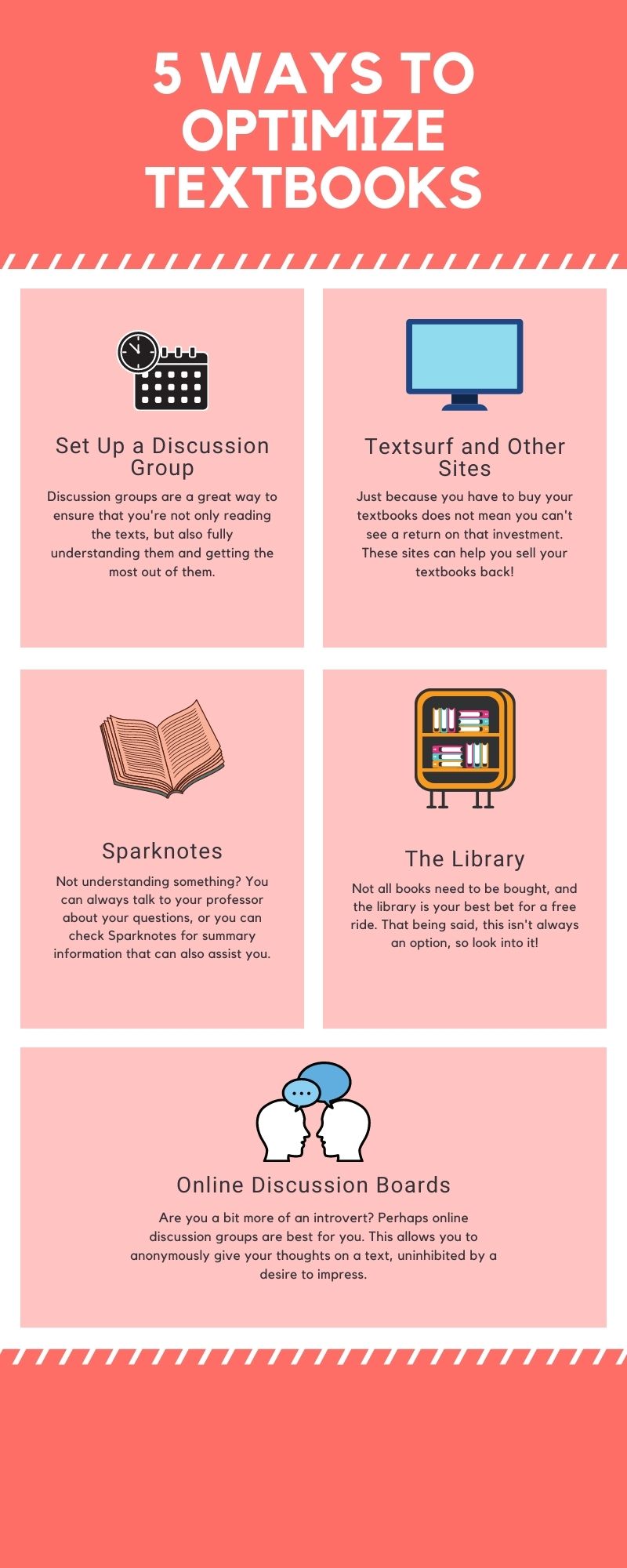Online Resources and Tips to Help You Get the Most Out of Your Textbooks
It’s no secret that college expenses often involve overpriced textbooks that are required by most, if not all, of your classes. And, it’s a dance we do every semester, in which students must spend unfathomable amounts of money, even if they’ll only use the textbook once during the semester.
So how can you get the most out of those books? In what ways can you get the best bang for your buck?
The below resources and tips are designed to help ensure your textbooks get the absolute most use, without breaking the bank.

1. Textsurf
Online resources for textbooks are always a great way to save money, even if it doesn’t necessarily mean you’re getting books for “free.”
Textsurf is an online platform through which you can sell back your books, rent, or buy them, and you can even compare prices to the other platforms available out there, such as Chegg or Amazon.
(As a side note, you should always check all platforms before making a purchase. Simply going to your campus bookstore, picking out all the books you need, and paying whatever the price is for all of them is certainly a convenience, but it’s one that’s going to cost you in the long run, as campus bookstores almost always charge top dollar when there are cheaper options out there).
The best way to utilize Textsurf is to first and foremost, plan your schedule. You should know which classes you are taking in advance, so plan your textbook shopping around your schedule.
Believe it or not, it’s also always beneficial to order your textbooks in advance, as this ensures there aren’t any inventory issues when it comes time for class to start. When you’re dealing with a depleted inventory of books, you end up paying much more for a book than it’s worth, simply because the stock cannot reach the demand.
Textsurf provides you all of these resources and then some to ensure you’re getting the most for your money, and also to give you the opportunity to earn some of that money back when the semester ends.
2. The Library
Visiting the library typically isn’t on everyone’s “must-do” list while at college, but it’ll become a resource you’re more and more accustomed to visiting as the semester goes on, especially if you’re trying to be frugal.
The bottom line is this: libraries are free resources to students.
You simply need to take out a library card, pick up the book that you’re looking for and you’re all set.
Of course, there are a couple of areas here in which you could end up in trouble. For instance, you likely won’t be the only student with this idea, which means that you may not be able to get the book that you need if you don’t act fast enough. The library only has a limited number of copies of each book, so if you miss out, you may end up needing to buy the book anyway, and you could be dealing with higher prices due to higher demand. You may also have waited too long and end up with a book that is out of stock.
The other issue is that libraries often only let students keep a book for a specific period of time. This means you won’t be able to hang on to a text all semester. So, if you’re looking for a textbook that you know you’ll use all semester long, the library may not be the best option for that specific book.
However, if you’re only doing a quick reading unit on a text, you should be able to get away with a library book, especially if you dedicate a certain amount of time to reading the text in its entirety and then return it before the deadline to avoid any late fees or issues with checking the book out again.
The bottom line? Libraries are great resources, but they aren’t going to be the most reliable option for you.
3. SparkNotes
Many people aren’t actually aware of this, but SparkNotes isn’t only an online Shakespeare reference to help you understand older texts. In fact, SparkNotes offers commentary, summaries, study guides, videos, and countless other resources for just about any text that you can think of, and that’s not specific to literary works.
Subjects such as biology, chemistry, film, economics, and even drama are available on the website for help analyzing whatever works you are currently reading in your course, whatever the course may be.
While it’s easy to fall into the trap of using SparkNotes to simply summarize a text without needing to read it, it’s more beneficial to use it in order to further understand a text that you’ve already read.
In other words, this isn’t a resource meant to help you cheat your way out of a textbook, but rather to help you get the most out of your textbook, ensuring purchasing it was not a waste of money.
4. Discussion Groups
Starting a discussion group is a great way to stay on top of your coursework, as it not only holds you accountable for getting your homework done, but it also helps you to discuss and further digest the readings that you’ve been assigned in order to do well in your class.
Discussion groups typically consist of small groups of individuals from the class you’re taking that meet regularly (cadence is up to those within the group and how often is necessary to meet to discuss) to talk through the readings and help each other get a better understanding.
These groups are a great way to ask questions, analyze things you hadn’t thought about in your own reading and ultimately get other perspectives to see if you’re on the right path in your own studies.
These groups are also great for creating study guides and preparing for tests and quizzes, as everyone can provide feedback as to what they believe is important, rather than everyone guessing and attempting to prepare on their own.
Basically, if you’re able to get together a group of three or more individuals for weekly or bi-weekly class discussions, you’ll be getting the most information out of your textbooks as possible.

5. Goodreads
While it’s most commonly known as a Facebook for Readers, it’s also a great resource for college students.
Goodreads is typically used to share the books you are reading with those in your friends’ network. This way, you can get tailored recommendations, check out what’s new in the literary world, and even keep up with your friend’s bookshelves.
But more than that, Goodreads offers students several resources that are beneficial. As a disclaimer, textbooks and other assigned readings may not be included on here, but many literary works will be.
Through Goodreads, students can join in on discussion boards, check out quotes from their texts, and even take quizzes to ensure they’ve gained as much information as they can from their books.
You can also join any number of groups, or even start your own for online discussion groups, especially if in-person discussion groups don’t work in your schedule at the moment.
6. Campus FB Groups
When you first began attending your university, you typically are added to a campus Facebook group to meet other individuals that are attending college at the same time as you. You may even have been added to groups for your specific classes, your dorm building and/or floor, and possibly even some of the teams and clubs you’ve joined.
These campus Facebook groups are typically not alone, as there are countless more that you can join and add as you continue your experience at your university.
So, why not use these resources to your advantage, especially when everyone is already familiar with Facebook and has access to it nearly 24/7?
As previously mentioned, discussion groups do not work for everyone, as some individuals have a full schedule on top of part-time jobs and internships and simply can’t fit in another class.
Online discussion boards, such as a new Facebook group, allow you to get your fellow classmate’s thoughts without having to take the time to book a room on campus for a weekly discussion.
In addition, having online discussion boards allows you to respond to and read all of the posts on your own time, so you don’t feel rushed and can actually take the time to absorb all the information and ask questions.
For many introverts, this is actually the best option, as it allows you to ask questions that you wouldn’t typically ask in a group setting, giving you that invaluable information that you haven’t been getting in class and in the in-person discussion groups.
Plus, they’re super easy to set up and invite all your classmates to, so you’re likely to get much more participation and therefore much more information to assist you in your studying.
7. Talk to Your Professor
Last, but certainly not least, you can always communicate with your professor on a variety of topics, including textbooks, information you need to know, and whether or not you even need books for their class. What this means, in the most basic sense, is that if you don’t think you’re understanding a text fully, you should talk to the expert.
Whether you simply ask questions in class discussion, come in early or stay behind to have a one-on-one discussion or schedule a time during office hours to meet with them for more in-depth conversation, you should always be seeing your professor as a resource when it comes to your textbooks.
Whether you think a text is unclear or simply want to know what information from the text is going to be pertinent to an upcoming test, quiz, or paper, your professor is the perfect resource to get this information from.
In addition, you should always talk to your professors to determine which textbooks are required, and which are optional. You can also ask about the versions of each textbook that you will need, as well as any other book-related questions before even taking the class. Most professors understand when a student is on a budget, so they will give you as much information as they can regarding what you will need to be successful in their class.
While there’s always the chance that they will say you need a textbook and then you never actually end up using it, more often than not, professors are going to give you exactly the information you need to make an educated decision on whether or not you’re going to need certain works for your class.
While it seems like talking to your professor outside of class is wasting their time, or adding a burden to them, it’s actually what they prefer, as it means you’re taking their class seriously and attempting to do your best in it, which is really all they’re asking for.
So knock on their door and don’t be afraid to bother them, because the truth is, they’re eager to help you further understand their assigned readings. It’s a win-win!

College is expensive, and textbooks are no exception. Whether it’s a few literary works for an English class, a giant, dull textbook for a History course, or a science book that weighs as much as you do, everyone is buying them, and everyone is feeling the financial strain of doing so.
If you, like most students, feel that you’re not getting enough use out of these expensive books, the above list is a great starting point for ensuring you’re using those textbooks for all that they’re worth, and then some.
While we can’t eliminate the cost of textbooks altogether, as they are a necessary evil, we can help point you in the direction of some amazing resources to turn that cash spent on textbooks into an investment rather than allowing you to simply throw away your money without purpose.
Happy reading everyone!


